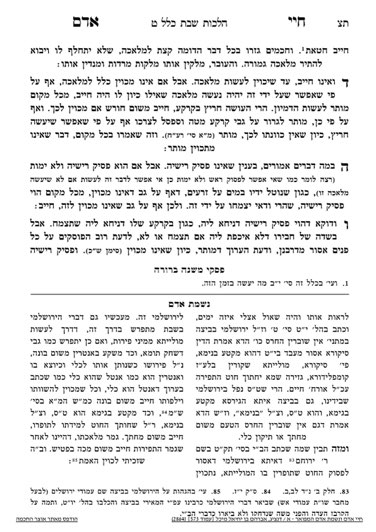We are continuing siman 3, where we left off learning about issurei derabanan. When it comes to Shabbos, issurei derabanan are referred to as a shevus, rather than simply a derabanan. The Rambam and Ramban understand that they have a different name because they are more significant than a “standard” issur derabanan. It is almost as though the Torah gave a mandate to Chazal to make Shabbos Shabbos-dik, and to limit what can be done on Shabbos in order to give it a different feel. The Rambam’s language (Shabbos 21:1) is “the Torah says to rest on Shabbos, and one should refrain from actions even if they are not melacha. These are the actions Chazal limited because of shevus. Some of these limitations are as a result of a concern that they look like melacha, and some are a result of the concern one will confuse them with issurei deoraysa [and think an issur deoraysa is actually muttar to perform on Shabbos].
The Tiferes Yisroel takes this concept one step further, and writes that actions which are considered uvda d’chol fall under the same concept.
In Parshas Emor (23:24), the Ramban writes that the word shabbason in the pasuk can be understood with the Mechilta in Parshas Bo. The Mechilta asks why the pasuk regarding Pesach prohibits melacha on Pesach, and also states ushmartem es hayom hazeh, to guard/protect Pesach. The Mechilta explains that the first pasuk prohibits performing melacha, and the second pasuk prohibits issurei shevus. Again, we see this concept that Chazal took this command from the Torah to limit actions on Shabbos in order to increase the feeling of Shabbos.
The Ramban continues, and writes that there is a mitzvah in the Torah to rest on Shabbos even from actions which are not assur. Otherwise, a person will spend the entire Shabbos performing actions which are not assur, such as cleaning, selling, taking care of animals, and many others. He writes that the concept of the issurei shevus is based on the concept of asmachta, that the Torah gives a source for this din derabanan, and more than that, Chazal understood Hashem as giving them a mandate to create a Shabbos atmosphere.
There are certain places which have a safeik regarding to correct day of Shabbos, due to the International Date Line. In those places, the approach of some poskim is to keep two days of Shabbos out of safeik, where on one day a person keeps all issurei Shabbos, and on the other day they keep only the issurei deoraysa. We will discuss this further in the next shiur, be’ezras Hashem.
Summary
- Issurei derabanan on Shabbos are known as shevus, and stem from Hashem giving Chazal a mandate to engender a Shabbos atmosphere, and more than just protecting a person from transgressing issurei deoraysa.



